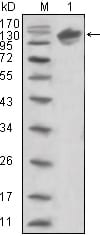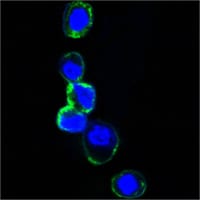

| WB | 咨询技术 | Human,Mouse,Rat |
| IF | 咨询技术 | Human,Mouse,Rat |
| IHC | 咨询技术 | Human,Mouse,Rat |
| ICC | 1/200 - 1/1000 | Human,Mouse,Rat |
| FCM | 咨询技术 | Human,Mouse,Rat |
| Elisa | 1/10000 | Human,Mouse,Rat |
| Aliases | HER3; c-erbB3 |
| Entrez GeneID | 2065 |
| clone | 2F9 |
| WB Predicted band size | 148kDa |
| Host/Isotype | Mouse IgG1 |
| Antibody Type | Primary antibody |
| Storage | Store at 4°C short term. Aliquot and store at -20°C long term. Avoid freeze/thaw cycles. |
| Species Reactivity | Human |
| Immunogen | Purified recombinant extracellular fragment of human ERBB3 (aa22-369) fused with hIgGFc tag expressed in HEK293 cells. |
| Formulation | Ascitic fluid containing 0.03% sodium azide. |
+ +
以下是关于ERBB3抗体的3篇代表性文献及其摘要概括:
---
1. **文献名称**:*"ERBB3/HER3 inhibition enhances the efficacy of HER2-directed therapies in HER2-amplified cancers"*
**作者**:Schoeberl, B. 等
**摘要**:该研究开发了一种抗ERBB3单克隆抗体(MM-121),通过阻断ERBB3与HER2异源二聚化,抑制下游PI3K/AKT信号通路,增强HER2靶向药物(如曲妥珠单抗)在乳腺癌中的疗效,克服耐药性。
2. **文献名称**:*"A biparatopic HER3-targeting antibody enhances tumor growth inhibition via combined blockade of HER2/HER3 signaling"*
**作者**:Li, B. 等
**摘要**:研究者设计了一种双特异性抗体(MEHD7945A),同时靶向HER3(ERBB3)和EGFR。实验表明,该抗体通过抑制配体依赖性和非依赖性信号传导,显著抑制结直肠癌和头颈癌模型的肿瘤生长。
3. **文献名称**:*"HER3 antibody sensitizes pancreatic cancer to chemotherapy by modulating the tumor microenvironment"*
**作者**:Huang, S. 等
**摘要**:研究发现抗ERBB3抗体(Lumretuzumab)可降低胰腺癌中肿瘤相关成纤维细胞(CAFs)的活化,增强化疗药物吉西他滨的渗透性和疗效,揭示了靶向ERBB3在改善肿瘤微环境中的作用。
---
以上文献涵盖了ERBB3抗体在信号通路阻断、双靶点策略及微环境调控等方面的关键研究,可作为该领域的核心参考。
ERBB3 (also known as HER3) is a member of the epidermal growth factor receptor (EGFR) family of receptor tyrosine kinases. Unlike other EGFR family members, ERBB3 lacks intrinsic kinase activity and relies on heterodimerization with other receptors, such as HER2. to activate downstream signaling pathways like PI3K/AKT and MAPK. These pathways regulate critical cellular processes, including proliferation, survival, and differentiation. ERBB3 is overexpressed or aberrantly activated in various cancers, including breast, lung, and colorectal cancers, where it contributes to tumor progression, metastasis, and resistance to targeted therapies. Its role in HER2-amplified breast cancer, in particular, has made it a therapeutic target of interest.
ERBB3-targeting antibodies are designed to block ligand binding (e.g., neuregulins) or induce receptor internalization/degradation, thereby inhibiting oncogenic signaling. Examples include patritumab and seribantumab, which have been evaluated in clinical trials for solid tumors. However, challenges such as compensatory signaling, limited efficacy as monotherapy, and toxicity have prompted research into combination therapies, such as pairing ERBB3 antibodies with HER2 inhibitors or chemotherapy. Additionally, diagnostic antibodies are used to assess ERBB3 expression levels in tumors to guide personalized treatment strategies. Despite mixed clinical outcomes, ERBB3 remains a focus in cancer research due to its central role in resistance mechanisms and potential as a biomarker.
×